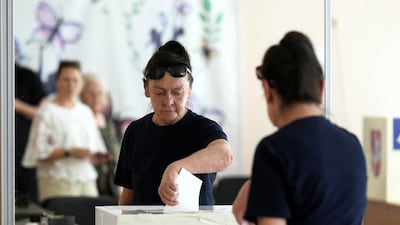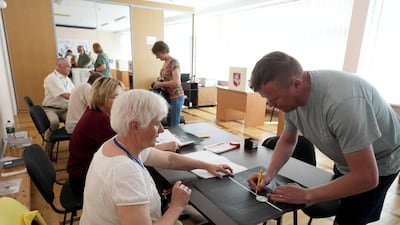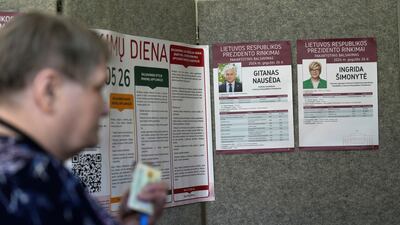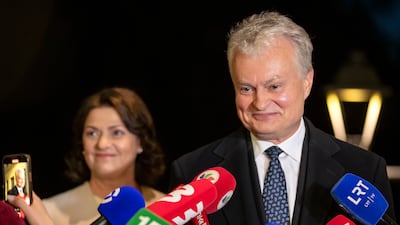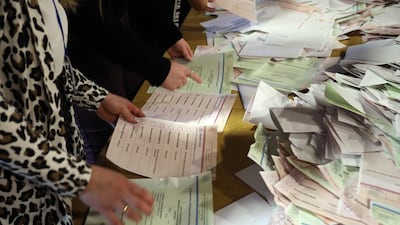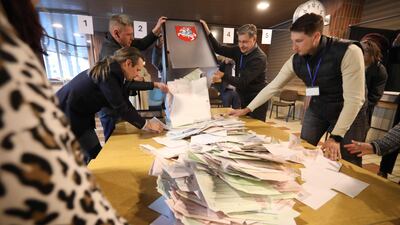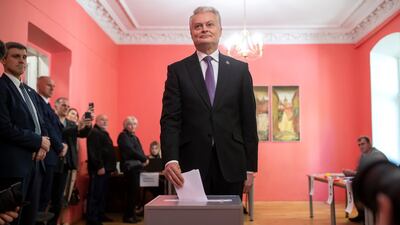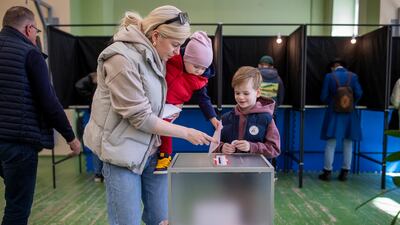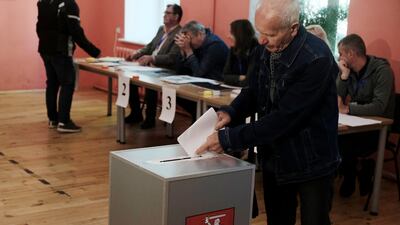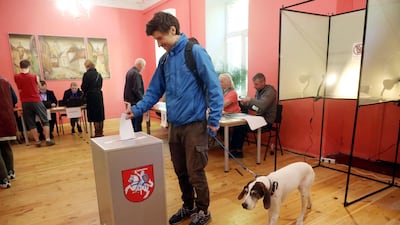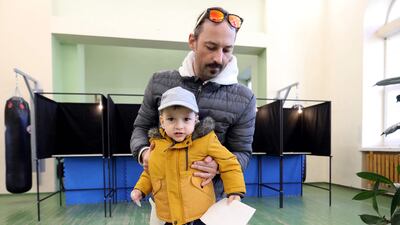Gitanas Nauseda won the first round of Lithuania's presidential election, moving the outspoken Vladimir Putin critic closer to securing a second term in office.
Lithuanians cast their votes on Sunday amid concerns about Russia's intentions for the Baltic region and Moscow's recent battlefield gains in the Ukraine war.
Mr Nauseda took 44.5 per cent of the vote, while Prime Minister Ingrida Simonyte came in second with 19.9 per cent, the Election Committee said on its website. The two rivals will face each other in a run-off on May 26, having fallen short of 50 per cent in the first round of voting.
Polls showed Mr Nauseda, who has taken a hard line against Russia over the war in Ukraine, had solid public backing, particularly among people in rural areas and those with more conservative views.
Turnout in the first round was 59 per cent, the highest in nearly three decades, the Election Commission said.
“I’m prepared to steadily seek victory in the second round and I believe I’ll be successful,” Mr Nauseda said on election night. “I’m thankful for the strong support from the people. I want to continue work for another five years.”
He also pledged to maintain pressure on Lithuanian's western allies to deliver increased military support for Ukraine. "Ukraine President Volodymyr Zelenskyy already said it all," he said. "They don't need our declarations of good will, they are of no use in a fight – they need air defences. Until they have air defences, Ukraine will stay vulnerable."
Eight candidates ran in the presidential election, making it difficult for Mr Nauseda or any other candidate to secure the 50 per cent of the votes needed to win outright on Sunday.
The president’s main tasks in Lithuania’s political system are overseeing foreign and security policy, and acting as the commander of the armed forces. The importance of those roles has increased in the relatively small nation, on Nato’s eastern flank, as tensions rise between Russia and the West over Moscow's invasion of Ukraine.
The Russian exclave of Kaliningrad on the Baltic Sea is sandwiched between Lithuania to the north and east, and Poland to the south.
There is great concern in Lithuania, and in neighbouring Latvia and Estonia, about Russia's latest gains in north-eastern Ukraine. All three Baltic states declared independence after the collapse of the Soviet Union and built ties with the West, joining the EU and Nato.
Mr Nauseda is a moderate conservative who turns 60 this weekend. He defeated Ms Simonyte, 49, in a run-off in 2019 with 66 per cent of the votes.
Ms Simonyte is also facing a tough test in a general election this October, as government parties trail in the polls.
Mr Nauseda and Ms Simonyte both told national media they keep stockpiles of food at home in case of war. "I am doing all I can to make sure it will not be needed," Mr Nauseda said during a televised debate.
Both Mr Nauseda and Ms Simonyte support an increase in defence spending to at least 3 per cent of Lithuania's gross domestic product, from the 2.75 per cent planned for this year, to pay for the modernisation of its army and infrastructure to support a brigade of German troops, and their families, to be posted in Lithuania and made ready for from 2027.
While agreeing on Russia policy, the two rivals have a history of bickering and refuse to speak to each other.
A referendum was also on the ballot on Sunday, to ask whether the constitution should be amended to allow dual citizenship for hundreds of thousands of Lithuanians living abroad.
Lithuanians who adopt another nationality currently must give up their Lithuanian citizenship. The population of the Baltic nation has dropped from 3.5 million in 1990 to 2.8 million today.
For the first time, the Organisation for Security and Co-operation in Europe turned down an invitation by Lithuania to observe the election.
The Lithuanian government wanted to exclude monitors from Russia and Belarus, accusing the two nations – both members of the 57-member organisation – of being threats to its political and electoral processes.
The OSCE’s Office for Democratic Institutions and Human Rights said Lithuania broke the organisation's rules with the request.
It said observers did not represent their countries’ governments, that they must sign a code of conduct pledging political neutrality and that if they broke the rules they are no longer allowed to continue as observers.


